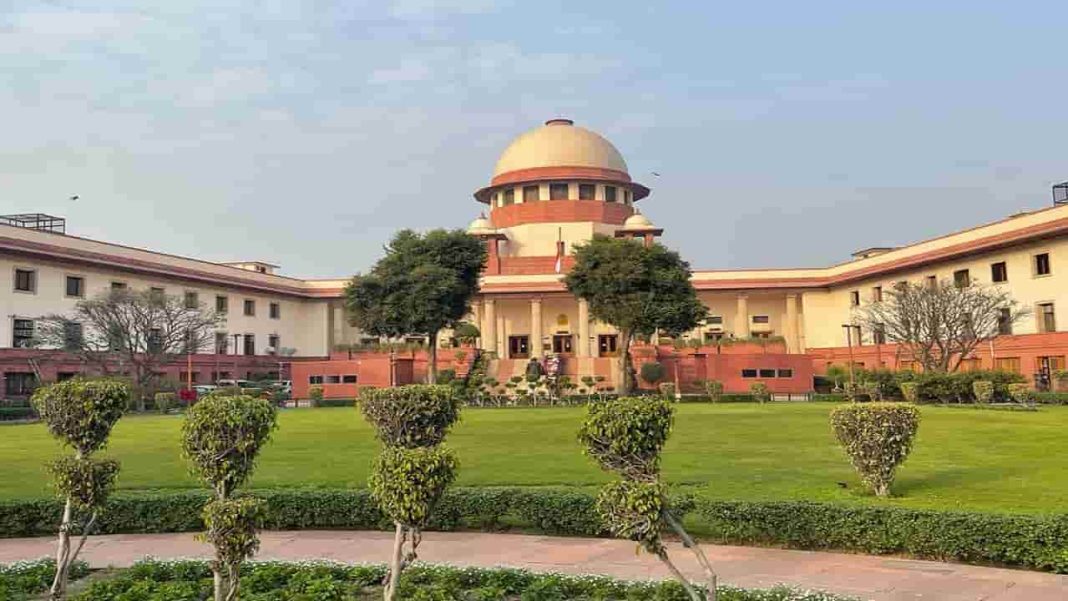The Supreme Court on February 23 observed that though the powers of the High Court under Section 482 of the Code of Criminal Procedure are wide and in the nature of inherent power yet, the said power cannot be exercised suo motu in a sweeping manner and beyond the contours of what is stipulated under the said Section.
The Division Bench of Justices M.R. Shah and Justice B.V. Nagarathna made this observation, while allowing a criminal appeal filed against the order dated August 5, 27 and 29, 2019 passed by the High Court of Judicature at Madras, by which the Single Judge of the High Court has directed to transfer 864 cases in which the final reports have been filed before the concerned Special Courts for Land Grabbing Cases pending in various districts.
It has also directed the concerned Special Courts before whom the final reports are filed, to return back the final reports filed by the concerned investigating officers of the respective police stations to be filed before the concerned jurisdictional Courts.
The facts leading to this is that the State of Tamil Nadu issued G.O dated 28.07.2011 creating 36 Anti Land Grabbing Special Cells in the State of Tamil Nadu with one cell each at the State Police Headquarters, 7 Commissionerates and 28 Districts except Karur, Tiruvannamalai and Nagappattinam Districts.
That consequent upon G.O Special Courts were constituted exclusively to deal with Land Grabbing Cases. That the aforesaid G.O. was the subject matter of controversy before the High Court.
Also Read: Supreme Court says Centre hasn’t honoured its verdict in tribunal reforms case
By a common order dated 10.02.2015 the High Court has set aside G O dated 28.07.2011 and G O dated 11.08.2011. While allowing those writ petitions, the High Court has also observed that the State Government is at liberty to enact any appropriate legislation on the lines of A.P. Land Grabbing (Prohibition) Act, 1982 or better legislations.
By order dated 27.02.2015 , the Top Court, while issuing notice stayed the operation and implementation of the order dated 10.02.2015 passed by the High Court. Meaning thereby, pursuant to the said interim order, both the GO are in operation and the jurisdiction of the Land Grabbing Cases is to be continued with the Special Cell/Special Courts.
During the pendency of the SlP , the Madras High Court by order dated 05.08.2019, the Single Judge of the High Court has allowed/disposed of the said petition seeking transfer of the said case from the Special Court to the Court of CCB and CBCID, Metropolitan Magistrate, Egmore, Chennai and has directed the concerned police officials to take back the final report from the Special Court for Land Grabbing Cases No. II, Chennai and to file the same before the CCB and CBCID, Metropolitan Magistrate, Egmore, Chennai.
Also Read: Whatsapp Admin not responsible for objectionable content by group member: Kerala High Court
A further order dated 27.08.2019 came to be passed by the Single Judge of the High Court directing transfer of other 82 cases pending on the files of the Special Courts to the jurisdictional Courts. Thereafter, again on a ‘special mentioning’ made by the Additional Public Prosecutor in the disposed of matter the Single Judge by order dated 29.08.2019 has directed transfer of 782 cases pending in the Special Courts to the jurisdictional Courts. Orders dated 05.08.2019, 27.08.2019 and 29.08.2019 are the subject matter of the appeals in the Top Court.
While considering the Appeal the Top Court noted that when the Single Judge passed those orders no proceedings were pending before the Single Judge and the said orders are passed on the ‘special mentioning’ made by the Additional Public Prosecutor.
“How such orders transferring approximately 864 cases pending in different Special Courts in different districts to the concerned jurisdictional Courts could have been passed in a disposed of matter and more particularly when none of the parties to the cases which are ordered to be transferred were parties before the High Court? To pass such a type of order on a ‘special mentioning’ that too, in a disposed of matter is unheard of.”
The Court went on to observe that the procedure adopted by the learned Single Judge for passing orders dated 27.08.2019 and 29.08.2019 directing to transfer 864 cases from the Special Courts in different districts to the concerned jurisdictional Courts is unknown to law. The practice of passing such orders on a ‘special mentioning’ that too, in a disposed of matter is to be deprecated.
“Before parting with these appeals, we observe that the High Courts ought to be mindful and conscious about the consequences of passing orders such as those impugned in these appeals. Though the powers of the High Court under Section 482 of the Code of Criminal Procedure are wide and are in the nature of inherent power yet, the said power cannot be exercised suo motu in a sweeping manner and beyond the contours of what is stipulated under the said Section. We hope and trust that the High Courts would be more circumspect before passing such orders which are impugned and set aside in these appeals:”,
-the order reads.


